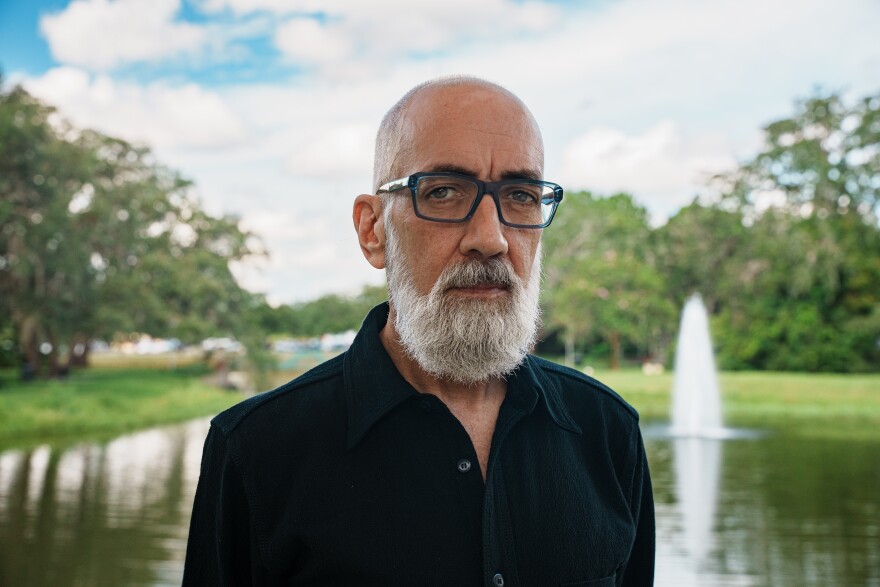The University of South Florida is hosting two concerts with music by Composer Paul Reller on Nov. 7 and Nov. 8.
He’s an Associate Professor at USF’s School of Music. His ǎbsoloot myoozǎk-Concert 1, “Power Karaoke and the Chamber of Hoorahs” takes the stage in an intimate concert on Friday, Nov. 7 at Barness Recital Hall on the Tampa campus. You can reserve tickets through this link.
There’s a larger concert on Nov. 8 at Peter and Cynthia Zinober Concert Hall, ǎbsoloot myoozǎk - Concert 2, “Broken Consorts.” If you head to this site, you can reserve tickets for this concert.
WUSF’s Susan Giles Wantuck spoke with Reller about his process.
The interview below has been lightly edited for clarity and length.
How would you describe your music?
I would describe it as modern, and I think that word has less traction today in a way, but it embodies atonal music as well as tonal.
I grew up on Igor Stravinsky, so that's kind of my starting point as [to] why I became a composer; he always considered himself an inventor of music as much as a composer.
He actually had that on his passport at one point, “music inventor.” And I really feel like I come from that tradition, so I'm always looking for new sonorities and new sounds, and that makes me what I would call a modern composer.
Would you say it’s in the classical genre, or what would you say?
People call it new music, contemporary classical. There's really no good word for it.
I think of it as hardcore classical because you have to be into it. You have to be into going to concerts and listening to music to end up listening to the kind of music that I write. It's not something you come to casually, I think.
So, it’s for the people who are really into hardcore, experimental kinds of sonorities and orchestrations and things like that.
What inspires you, is it traveling or other composers or sounds in the natural environment?
Other music is what really inspires me. Music is what got me into this game, and it still inspires me more than anything. I still find favorite composers that I can't get enough of.
And so, when I write the name of these two concerts, is “ǎbsoloot myoozǎk” the musak part is sort of just having fun, but absolute music was a concept from the 19th century that was sort of the antithesis of program music. So, absolute music is music that is for music's sake, in essence.
Tell me about your process in writing this music.
Well, these two concerts are really recent music. The oldest. There's one piece that's from 2018, so it's all stuff from the past couple of years, and some of it is quite fresh. Several premieres. And so it's all of a body of work.
And I like going to art shows and seeing a body of work that a curator has brought together. So this, I really wanted to put on something that is representative of what I've been doing lately. And so, I write very motivically. It's modern, but motivic writing is one of the oldest things you can do.
What is motivic writing?
Yeah, if you think of the first four notes of Beethoven's “Fifth Symphony,” the first movement, that's the motive for the entire movement. So, the whole thing comes out of those four notes, which are only two pitches. One of them is repeated three times. And so that kind of invention is old.
Bach’s music is all motivic for the most part. So it's an old kind of composition that I find myself working on with my students, because it's so basic that you sort of have to master being able to transform motifs and combine them with other motifs and things like that.
Are your concerts going to be at USF?
Yeah, both concerts are on the USF Tampa campus. The first one is in Barness Recital Hall, and that is duos and solos with electronics. And then the next night is in the big concert hall, and we have a lot of large ensembles.
I'm really humbled by the kind of support I've gotten from the school (USF School of Music). And to have the wind ensemble and 20-person brass ensemble and percussion ensemble, the clarinet ensemble, all be here on one night is remarkable.
Tell me about the first night. Are you going to be soloist? Who are the players?
I'm bringing four players in from out of state, and I've got a player I work with in town all the time. So those five people are going to be the only five players. So, Corey Merenda is a pianist in town I work with a lot.
I'm bringing Margaret Lancaster, a new music flutist from New York, Conrad Harris , a new music violinist. He plays with the Flux Quartet, amongst other people, Doug O'Connor, from Washington, DC, he plays with the U.S. Army bands and teaches.
And Mark Foley, who was the principal bassist with the Wichita symphony, and the second concert will conclude with a concerto for him and percussion.




